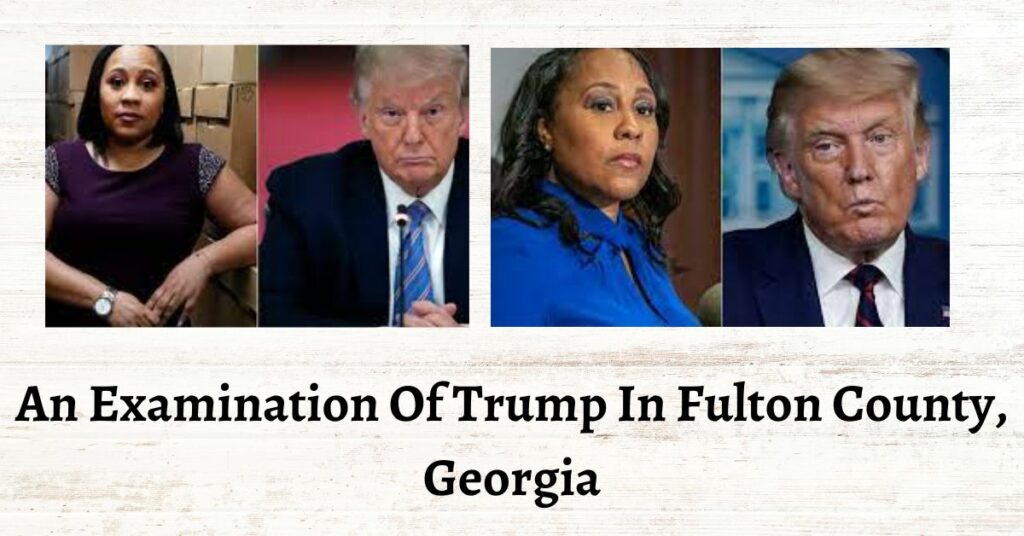The results of a free and fair presidential election were challenged between November 2020 and January 2021 under the leadership of then-President Donald J. Trump in an unprecedented effort. The main focus of that attempt was a broad-based campaign in Georgia to overturn his defeat, which was supported by numerous recounts and legal actions.
On February 10, 2021, Fulton County District Attorney Fani Willis announced a criminal inquiry into the actions of the former president and his friends due to the potentially illegal nature of certain of Trump’s behavior. Charges might be decided upon as soon as November or December 2022, according to her.
In this updated version of our report from October 2021, we go over the inquiry and its foundation. We evaluate the publicly available information and the pertinent legal framework, then we assess the possibility of criminal prosecution for the former president’s actions in Georgia. We come to the conclusion that Trump faces a real threat of facing criminal charges in Fulton County.
You can also check
- Trump Says It McConnell Fault That The GOP Lost Elections: He Messed Up The Midterms.
- A Judge Fined Trump Lawyers For Bringing A Frivolous Collusion Case Against Clinton And The DNC
FACTS
When he declared victory in Georgia prior to the vote count being completed, Trump started his efforts to have the election thrown out. Trump repeatedly tweeted false allegations of voter fraud against Georgia election authorities as votes were still being counted from November 3 into the next week, forcing them to deviate from established election processes.
This devastating new report from Brookings makes clear that the Fulton County, Georgia investigation into Trump’s election crimes has hit pay dirt and puts bright orange in Trump’s future wardrobe — whatever DOJ does https://t.co/m9Ndy2EkiV via @BrookingsInst
— Laurence Tribe (@tribelaw) November 14, 2022
In the meantime, a number of lawsuits contesting his defeat were brought in state and federal courts by his campaign and sympathisers. As two recounts confirmed Biden’s narrow victory, Trump’s efforts intensified. Trump reportedly started calling Georgian officials personally in December 2020, including Governor Brian Kemp and Attorney General Chris Carr, to ask them to back initiatives intended at decertifying his defeat.
Rudy Giuliani, Trump’s personal attorney, stood before the Georgia legislature and made fictitious claims of fraud and legal misrepresentations in an effort to persuade state politicians to take extraordinary measures to overturn Biden’s victory.
Trump later maneuvered to install a loyalist at the head of the department after his own acting attorney general refused to use the department to support his efforts. The loyalist planned to send a draught letter designed to deceive and influence the Georgia legislature into convening to overturn the election results.
Additionally, it has been claimed that representatives from the Trump campaign helped organize a meeting of Republican state officials for December 14, 2020, so they could sign and submit a forged electoral certificate to Congress and the National Archives claiming Trump had won the state.
Finally, on January 2, Trump called Brad Raffensperger, Secretary of State, as the January 6 legislative certification of Joe Biden’s victory drew near. Trump threatened and begged Raffensperger to “find” 11,780 votes during the call in an effort to sway the outcome of the state’s presidential election in his favor.
You can also check
- A Judge Fined Trump Lawyers For Bringing A Frivolous Collusion Case Against Clinton And The DNC
- The Tropical Depression Nicole Delays NASA, SpaceX Launch
LAW
Trump appears to be significantly at risk of being prosecuted for both election and non-election crimes in violation of Georgia state law based on these facts and a wealth of further public reporting. Georgia’s prosecutors may consider the following election-related offences: solicitation to commit election fraud, in violation of Georgia Code Ann.
21-2-604(a); intentional interference with the performance of election duties, in violation of Georgia Code Ann. 21-2-597; interference with primaries and elections, in violation of Georgia Code Ann. 21-2-566; and conspiracy to commit election fraud, in violation of Georgia Code Ann. 21-2-603.
While the specifics of these offenses vary, the common denominator is that Trump may be shown to have urged Georgia officials to alter the election’s legitimate results through actions like the call to Raffensperger in which he was instructed to “find 11,780 votes” and the potential orchestration of the false elector’s scheme.
If we’re going to talk about how Donald Trump has been credibly accused of committing at least 56 crimes while in or running for office, we are going to really 👏 talk 👏 about 👏 it 👏 https://t.co/v2tXagWO1p
— Citizens for Ethics (@CREWcrew) November 15, 2022
Trump’s entire pattern of behavior both before and after the election points to a clear, persistent intent to lobby for and put pressure on elected authorities to overturn the results. According to Georgia state law, not only Trump but also other people, such as Rudy Giuliani and the 16 fake electors who all won, may be held criminally liable.
Evidence also suggests that Trump and his group, including the fake electors, may have committed additional offenses unrelated to the election, such as making false statements in violation of Georgia Code Ann. 16-10-20, improperly influencing public officials in violation of Ga. Code Ann. 16-10-93, forging documents in the first degree in violation of Ga. Code Ann. 16-9-1, and criminal solicitation in violation of Ga.
Code Ann. 16-4-7. The same fundamental facts are at play: Trump is accused of misrepresenting Georgia officials about the 2020 election and using that misrepresentation, intimidation, and threats to pressure them into changing the outcome of the election.
Final Lines:
Hope you find our post valuable for you… Many thanks for taking the time to read this! If you appreciate it, please leave a comment and share it with your friends. There are other articles available on newsconduct.com

